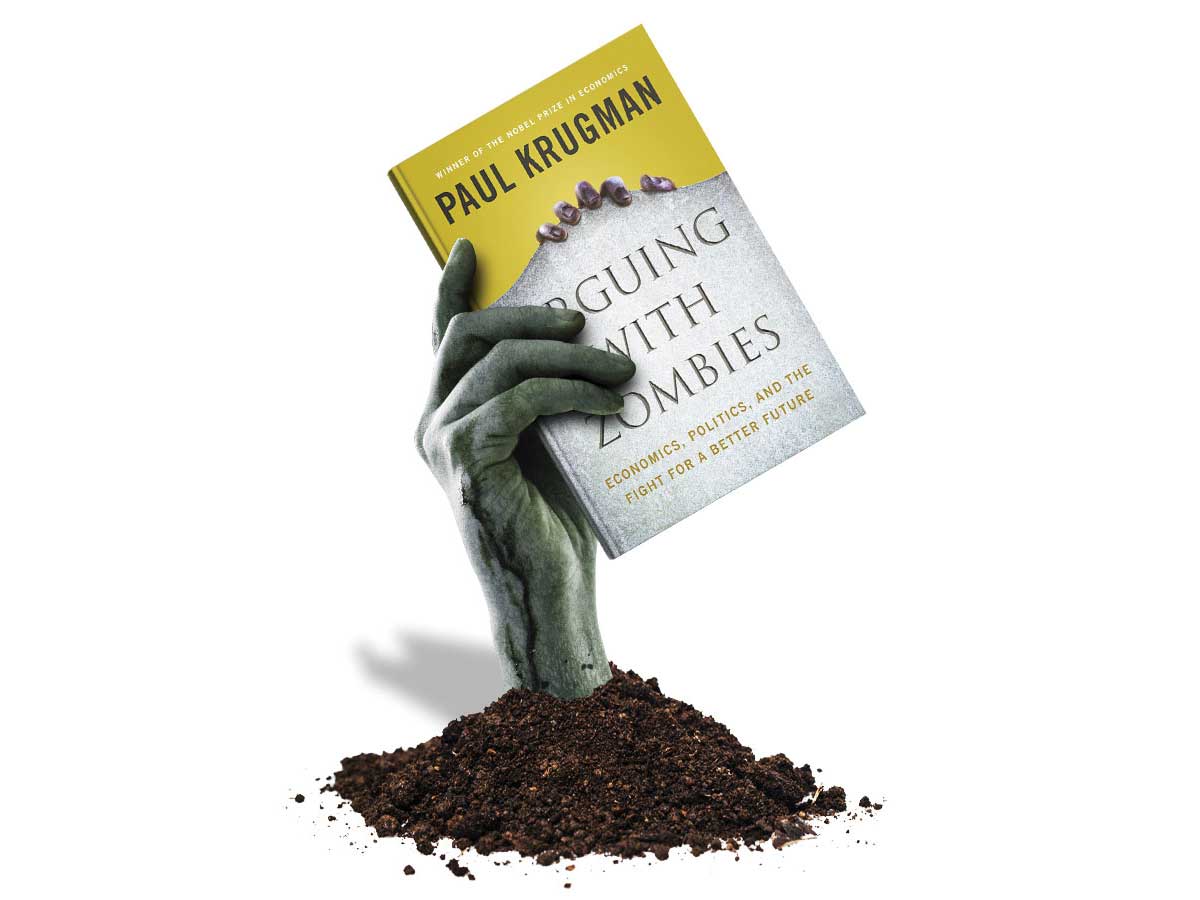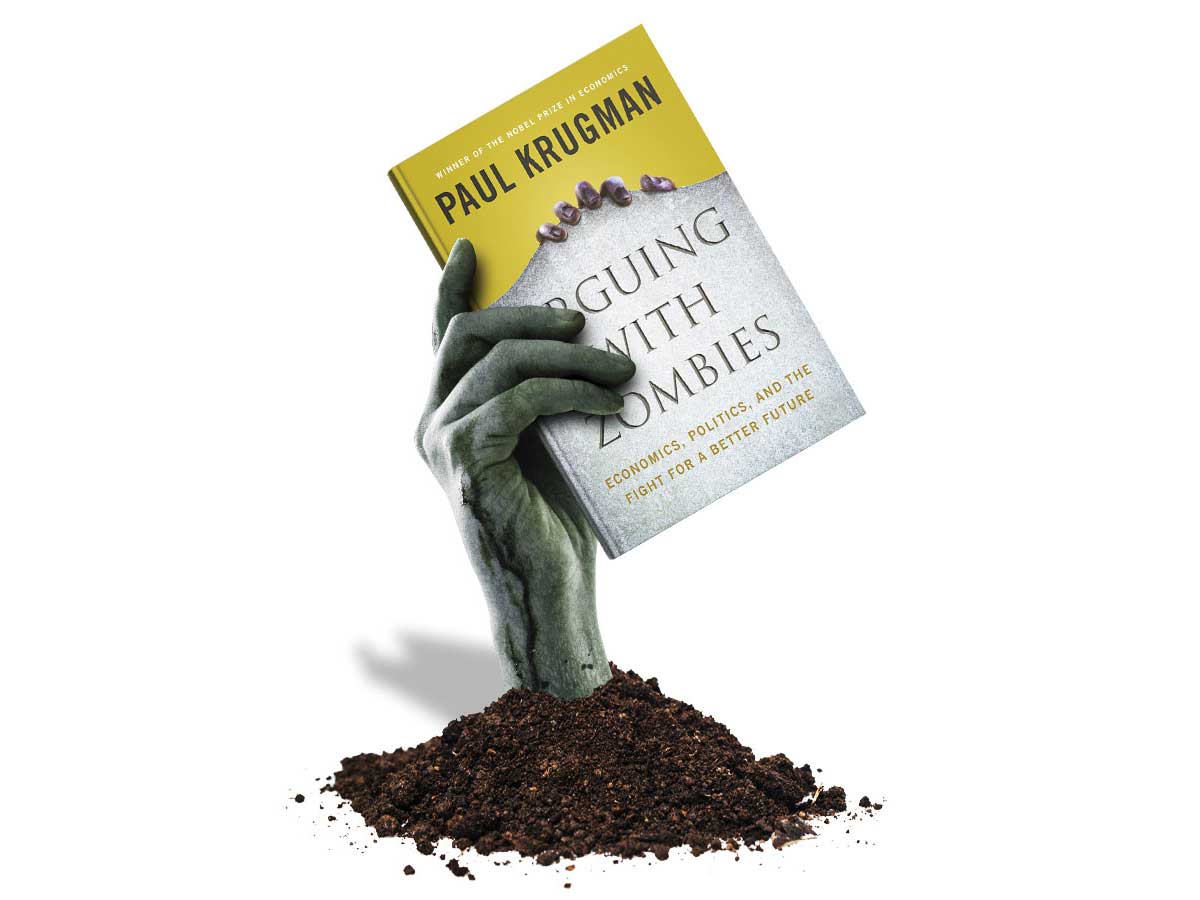
Economist Paul Krugman’s new book axes outdated policy ideas
 Arguing With Zombies groups decades of columns into 18 categories—from “Trade Wars” to “Trump” to “Eek! Socialism!”—all headed by brief new essays (iStock)
Arguing With Zombies groups decades of columns into 18 categories—from “Trade Wars” to “Trump” to “Eek! Socialism!”—all headed by brief new essays (iStock)
There are a lot of economists who can be described as eminent, at least among their peers and national policymakers, but probably none as outright famous in the world at large as Paul Krugman. A New York Times columnist and distinguished professor of economics at the Graduate Center of the City University of New York, he is surely the only member of his profession to have won a Nobel Prize and to have inspired a recent tweet from Donald Trump demanding the Times fire him. The U.S. president’s distaste, widely shared in his Republican Party, comes from the polemical sting in Krugman’s columns. A rare combination of gifted popular communicator and deep academic thinker, Krugman regularly and ferociously assaults Republican policy ideas that he believes should have died long ago, but that “keep shambling along, eating people’s brains.” In 21st-century America, Krugman writes in Arguing With Zombies, a new collection of his Times columns, no economic proposal is or can be judged on its merits: “Everything is political.”
The irony of the situation is that Krugman takes considerable grief from the progressive wing of leftist political thought for his incrementalism and his belief in regulated markets, albeit not as much as he takes from the right for denouncing unregulated markets. As far as Krugman is concerned, his adherence to Keynesian moderation—government stimulus in hard times, prudent cutbacks in boom eras—84 years after British economist John Maynard Keynes first published The General Theory of Employment, Interest and Money, makes him the conservative in the room. Krugman’s government experience, in fact, consists of a brief stint in Ronald Reagan’s White House. But in 1999, nine years before he was awarded the Nobel, Krugman began his Times columns in full political outrage, already chasing the undead with a vengeance.
Krugman originally used the term “zombie idea” to deal with the claim, constantly disproven and constantly revived, that Canadians regularly flood across the U.S. border in pursuit of primary health care. But there are others he has found worthy of the tag, including the “death panel” horrors of Obamacare, the shrill cries of “deficit scolds” and what he now calls the “ultimate zombie”: the trickle-down and economy-boosting benefits of cutting taxes for the wealthy.
Krugman’s “ultimate zombie”: the trickle-down benefits of cutting taxes for the wealthy
Arguing With Zombies groups decades of columns into 18 categories—from “Trade Wars” to “Trump” to “Eek! Socialism!”—all headed by brief new essays. Throughout, Krugman pursues a handful of interconnected themes. One is that Donald Trump is no outlier, but the distilled essence of his party. He may have changed the Republican Party into a cult, Krugman opines, but he hasn’t worsened its policy prescriptions or corrupted its motives—those were already faits accompli.
That’s why there are so many columns dating from the George W. Bush presidency, hammering Republican policies that are remarkably consistent with those of today, and even a 1992 article accusing opponents of using what would now be called “alternative facts.” And there is reference after reference to the “ultimate zombie,” which the economist believes is set to dominate American socio-economic policy debates before and after November’s presidential election. Should Trump return to office, Krugman asserts, his administration and its congressional allies will proceed to attack the deficit-ballooning effects of their 2017 tax cuts—which were supposed to pay for themselves—by slashing expenditures on Social Security and Medicare.
Krugman goes at it all with his four rules of punditry, of which the first two (“stay with the easy stuff” and “write in [plain] English”) are essentially inarguable. That’s not the case with the final two: “be honest about dishonesty” and “don’t be afraid to talk about motives.” He also urges the media, as well as his fellow experts, to avoid excessive both-sides-ism. Krugman’s favourite example of this scourge in contemporary mainstream media is coverage he characterizes as, “Views differ on the shape of the planet.” In other words, those who declare the earth is flat, in his opinion, do not deserve any publicity at all.
The four rules reflect Krugman’s belief that the opponents he calls “professional conservative economists”—as opposed to “conservative professional economists,” whose arguments he takes seriously—are even worse than flat earth proponents. They are not pushing zombie ideas in the mistaken belief they are true, Krugman argues: They know they are false, as has been shown since the Reagan administration. For Krugman, trickle-down economics in particular is a concept pushed for political ends, for the benefit of the rich and to provide an excuse for reducing benefits for the rest of society.
Positing that one’s opponents are not simply mistaken but ill-intentioned raises the very real chance his book may alienate America’s remaining neutral voters. Zombies is in many regards merely a return to what was called “political economy” in Adam Smith’s day, long before the rise of what Krugman calls “the technocratic dream—the idea of being a politically neutral analyst helping policymakers govern more effectively.” But in a hyper-partisan, media-siloed era, centrist voters are a dwindling demographic in the U.S., and Krugman argues that it is no longer possible to argue the future path of his country while putting aside that crucial “political” adjective. Krugman makes a compelling—and clarifying—case that economics cannot be separated from politics.
BOOK CLUB
Looking for other inspiring reads? Take your pick from the best business books of 2019. These reads will help you stay on track with your resolutions for 2020, while these four classic sports books have lessons applicable to the boardroom as to the playing field.